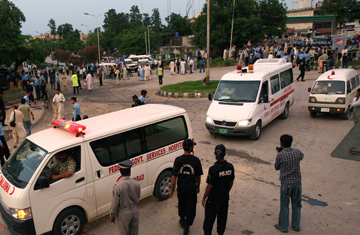
Ambulances leave the scene of a suicide bombing against policemen, according to officials, near the Red Mosque on July 6 in Islamabad, Pakistan.
At least 18 people are feared dead in an explosion that rocked the Pakistani capital of Islamabad Sunday. The target appears to have been policemen who had been deployed to guard a ceremony and conference marking the first anniversary of a government raid on an extremist mosque and seminary complex. The explosion, which took place at a popular food market adjacent to the rally, rattled windows across the capital. Police, who have cordoned off the area for fears of a secondary explosion, suspect that it may have been detonated by a suicide bomber on foot.
Thousands of Islamic seminary students, joined by members of banned militant groups from across Pakistan, gathered near the site of the Red Mosque to commemorate the death of some 100 militants and students who had faced down the Pakistani security forces in a standoff that rocked Pakistan. The nine-day siege, code-named "Operation Silence," culminated in a vicious firefight in the usually tranquil capital that killed the mosque's firebrand prayer leader, Abdul Rashid Ghazi. At the end the mosque was still standing, but the seminary, or madrassa, had been reduced to rubble.
The commemoration ceremony, followed by a seminar and a protest rally, started calmly, but as the crowd grew, tensions rose. Former students, both male and female, demanded the release of Ghazi's brother and Mosque head Maulana Abdul Aziz, who has been detained by government forces since his capture a year ago on July 4. Aziz had been caught trying to escape the madrassa complex dressed as a woman, wearing the all-encompassing black hijab. His wife, headmistress of the woman's madrassa, was released.
The siege itself ended a tense six-month standoff between the seminary students and the government. In January of 2007 students from the women's madrassa took over a nearby children's library to protest the destruction of an illegal mosque that had been built on government property. Tensions escalated when seminary students embarked on a vigilante campaign in the capital, forcing music and video shops to close down and kidnapping suspected brothel workers. For several months the government refused to crack down on the students, for fear that any action against them would ignite the wrath of religious conservatives.
Instead, the authorities attempted to negotiate. It didn't work. By the time the government laid siege to the Red Mosque and the adjacent seminary, it had become a symbol of religious defiance, not only for militant Muslims, but for many Pakistanis who were increasingly disillusioned with the military dictatorship led by President Pervez Musharraf. Though the students had harassed and frightened many in the nation's capital, who feared their attempts at Talibanization, they were largely revered as martyrs upon their death at the hands of the government security forces. The siege of the Red Mosque was a turning point for Pakistan, as opposition to the Musharraf regime mounted, and mosques and madrassas named after the men and women's seminaries sprang up across the country.
Baitullah Mehsud, head of the Pakistani Taliban and the man accused of assassinating former Prime Minister Benazir Bhutto, has embraced the cause of the Red Mosque and refers to it often in his public condemnations of Musharraf's government. Mullah Fazlullah, the leader of a militant group that took over the once popular tourist destination of Swat valley has sworn to avenge the death of those lost in the raid.
There have been scores of bombings and suicide attacks in Pakistan this year, but the capital had mostly been exempt from the violence until a blast in a popular Italian restaurant on March 15 killed a Turkish woman and wounded 10 others, including four FBI agents. Just over a month ago militants bombed the Danish embassy, killing six. Another bomb attempt was foiled a few days later when police captured a vehicle carrying large amounts of explosives.
So far, no one has come forward to claim responsibility for this attack, though the Pakistani Taliban's spokesman has suggested it may be a revenge attack for last year's siege. Even if no culprit is revealed, the message is clear. Terrorists are no longer limited to the lawless tribal lands along the border with Afghanistan. They have set their sights on the Pakistani capital, and the government seems increasingly unable to so anything about it.
